I have a lot of breeder friends, both pro and amateur, and can’t seem to stop obsessively following all things sporthorse breeding-related. Our trip to Belgium last year to visit farms and watch the sBs stallion show will forever be one of the highlights of my life… I was in heaven. So, ya know, I guess you could say that sporthorse breeding is a subject very near and dear to my heart. Having worked at a breeding farm in the past and been involved with the breeding industry in some capacity for many years now, I have made a lot of observations along the way. I have certainly learned a ton in the decade since I first embarked on the journey to create my first homebred – much of it by trial and error.
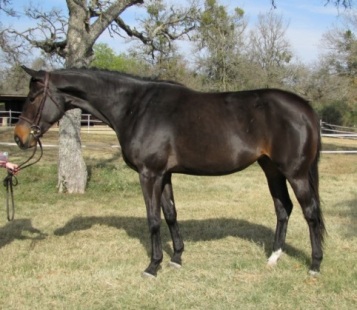
Since breeding Sadie this year for what will be my second homebred (because yes, even having seen all the terrible things that I’ve seen, I’m still dumb enough to do this myself – TWICE), I’ve gotten a lot of questions and comments, and heard a lot of stories from people thinking about breeding their own mares. A few people even asked for my advice. Oh dear. My advice? Well, you’re about to get it. Strap yourself in, because here we go.
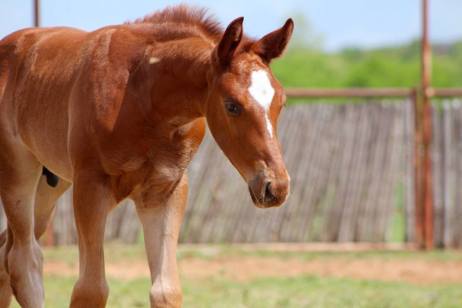
The mare is way more than 50% of the equation. She might contribute 50% of the pedigree, but foals tend to take WAY more after their dams in terms of general mannerisms, temperament, and often even in talent. There’s a reason those Europeans are all about their mare lines. Finding a good stallion is important, but having a good mare is imperative. If you don’t love pretty much everything about your mare, inside and out, you’re not going to like the baby very much once it gets beyond the cute, fuzzy phase (which is sadly quite short). I’m not saying your mare has to be world class, that’s unrealistic, but she needs to have a good temperament, you should find her enjoyable to own/ride, she can’t have any genetic or major conformational defects, and she has to be suitable for the sport you want to do.
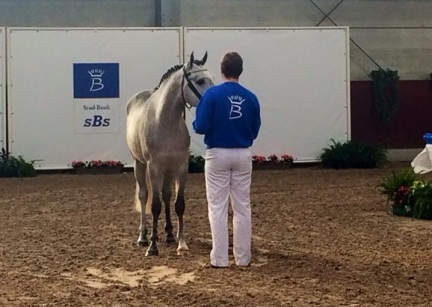
Warmblood registries can be really freaking confusing. If you’re breeding for any of the Olympic disciplines, or for the hunter ring, odds are that you’re going to end up going through a warmblood registry for foal registration and papers. Make sure you understand their guidelines, terminology, and fine print well in advance of breeding, so there aren’t any unpleasant surprises later on. Each registry is different, so it’s important to have a thorough understanding of the rules and regs of whichever one you choose. If you can, attend an inspection and get an idea of what you’re in for. Even better – present your mare for inspection BEFORE you breed her. And definitely never be afraid to ask questions.
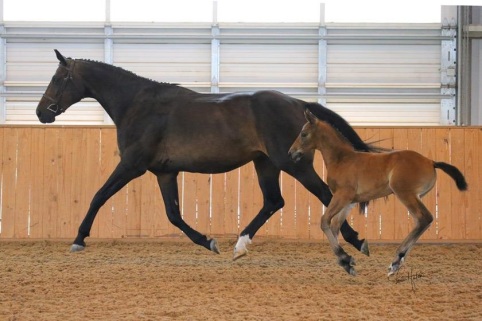
It can get really expensive really quickly. If it takes more than one attempt for the mare to become pregnant, if she has uterine infections, if your vet is not particularly proficient at reproductive work, if the semen quality is sub-par, if your mare needs to stay on Regumate for the duration of her pregnancy, if you have foaling complications, if the foal is unhealthy, if the mare dies, if the foal dies… all of these things can REALLY add up fast. And to add insult to injury, there’s a real possibility that you might have nothing to show for it in the end. Whatever you think your initial cost estimate is – write it down, light it on fire, and then start over with all of your numbers tripled.
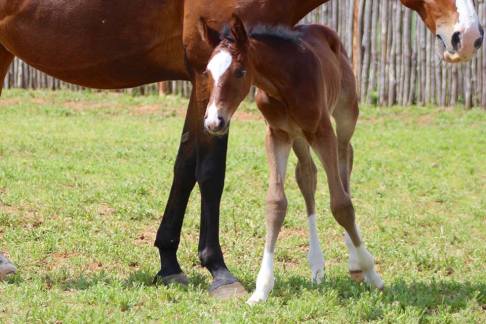
The stud fee is probably the least expensive part. Because of the last point, don’t even bother getting super concerned about saving a few hundred bucks on a stud fee. You see people on the internet all the time asking for stallion suggestions “under $1200”. Girl, no. Just no. If you luck into a good deal on a great stallion, that’s perfect, but find the best match you can, don’t quibble and fret over a few hundred bucks and allow that to be your determining factor. If such a relatively small amount of money causes you anxiety, this is not the adventure for you.
It is so important to do your research. In every regard, you must be thorough. Creating a life (and make no mistake, that’s exactly what you’re doing) is a really heavy responsibility, something that should not be done with reckless abandon or blind naivete. The stallion, his offspring, the farm he stands at, his fertility, your mare’s fertility, her offspring, all of their ancestors, performance, temperament, traits they pass on, traits they don’t pass on, registry options, etc etc… you need to know all of it. We live in the internet age – use it. Find pictures, find videos, talk to people, read up on the bloodlines. There is a ton of information out there.
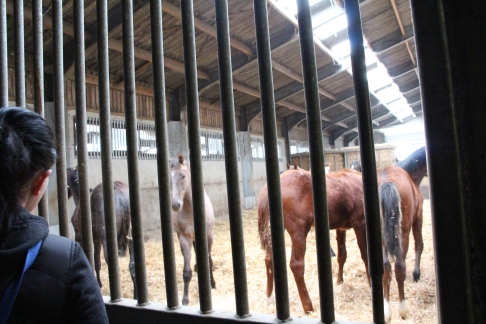
If you don’t have a good eye, enlist the assistance of someone who does. Can you pick a horse apart, piece by piece? Can you spot areas that need improvement, areas that are very strong, issues with movement, trends that are common among offspring? Can you tell a good front and hind end jumping technique from a bad one? Can you tell a decent canter from an excellent canter? If you want to increase the odds of producing a good match, you have to learn this, and you have to learn to see past personal feelings, a fancy looking horse, or a pretty picture. Every single horse has strengths and weaknesses, and every line has things that they consistently pass on or improve upon. Find them, evaluate them, and use them to help you make better choices.
The odds are in your favor… barely. Roughly 60-65% of breeding attempts result in a live foal. That means the other 35-40% either don’t become pregnant, lose the pregnancy, or have a complication that results in a stillborn foal. Finding an excellent repro specialist will increase your chances (sometimes exponentially) but this number is fairly steady industry-wide. Something will go awry more than 1/3 of the time. Expect it. Breeding can be heartbreaking.
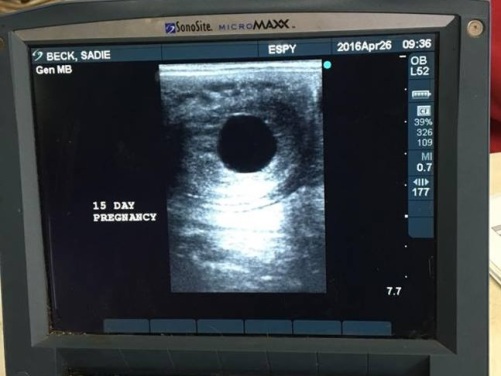
Finding a good repro vet is vital. With every cycle that your mare fails to become pregnant, or every aborted pregnancy, money and time are lost. Your local vet might be great at lameness but that doesn’t mean they’re great at repro. Find someone who specializes in reproductive work, especially if you have a tricky mare or are using frozen semen. Also be wary of industry professionals who use incorrect terminology. A really common one: there is no such thing as an “absorbed” pregnancy. If your vet uses this term, it could possibly be a red flag about their equine reproductive qualifications. A lost pregnancy is an abortion and it is expelled via the cervix – the conceptus is just so tiny in early pregnancy that you’re unlikely to ever find signs of it. If they’re using incorrect basic terminology, what else are they getting wrong on your dime?
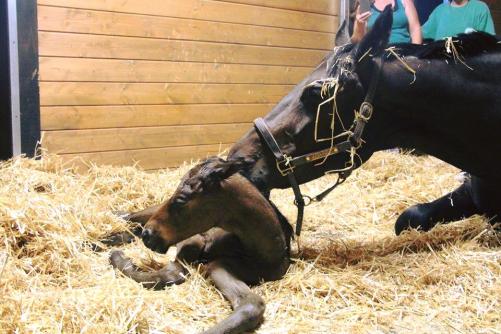
Foaling is effing scary. Yeah sure, it’s amazing, blah blah blah, miracle of life, blah blah, but really – it’s SCARY. Don’t believe me? Buy Blessed are the Brood Mares and try to get a good nights sleep after you read it (for real though, buy it, and The Foaling Primer, and throw in The Complete Book of Foaling for good measure). If you’ve never seen a mare give birth, you’re probably in for a very stressful night when your mare goes into labor. Foaling can be brutal, and things can go very very wrong in the blink of an eye. If you’re uncomfortable handling a foaling emergency, or if you don’t have a way to quickly and easily get a mare and foal to a vet for help, send your mare to a qualified professional for foaling. You don’t want that terror, trust me.

A live foal is only the beginning. Baby is here! You’ve made it! Mission accomplished! Well… you’ve made it to the beginning of the mission. Now you’re responsible for taking care of another horse, one that knows literally nothing. Those first few years are crucial – are you qualified to handle and train a horse that knows literally nothing? Foals are a totally different ballgame and to be honest, sometimes they’re huge jerks. Baby tantrums are real.
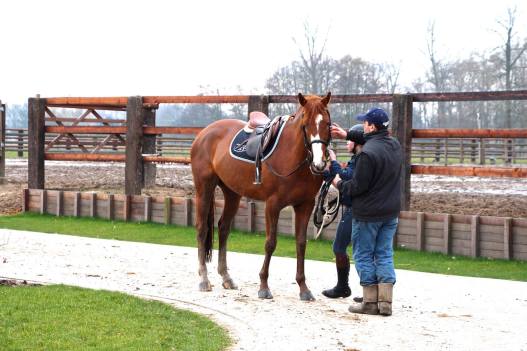
Breeding a horse to keep “forever” is unrealistic. This is something else you see pretty often, too. Person has a mare who they say is their “heart horse” and they really want to breed her. They know she has some major flaws, but that’s ok, because they’re going to keep the baby forever. Insert about one million eye rolls here. C’mon, man. That’s about as unrealistic as you can get. Things change, life happens, and there’s just no way to guarantee a “forever” anything. If you’re going to breed a horse, make something that is still useful and marketable. Train it to be a good citizen. Teach it manners, from day one. Those are the only ways to stack the odds in the horse’s favor so that it can have the best chance at a good life, whether it stays with you or not.
Duds are real. A lot of people don’t talk about this, but even the two very best parents can still produce an offspring that isn’t as good as they are. Sure, some things (like jumping ability) are more heritable than others, but if it were as easy as putting two great horses together, we’d have a world full of Sapphire’s and Sam’s and Blueberry’s. If you’re really trying to produce something very specific, you’re probably better off buying a horse that already exists. The idea of breeding is fun, because it lets us visit fantasyland for a while, but that’s a whole lot of time and money and risk to put into what is, ultimately, a best case scenario. Are you prepared for the worst case scenario?

BRAVO!!! I always love your writing, Amanda, but on this extremely important topic you have outdone yourself. This should be required reading for every single person who has a thought in their head about breeding their horse, from backyardigans to someone with a barn full of expensive horses. We know there are hundreds of thousands of unwanted horses in this country and I bet easily HALF of them should never have been born in the first place. Horses are too freaking expensive to just kick out another one because your mare has a uterus, or little Susie should see “the miracle of birth,” or little Johnny “can grow up with him,” or you paid $$$ for your mare and can afford sperm from $$$ trendy stallion so hey, let’s see what happens even though she’s the bitch from hell unsuitable even for most trainers. Or (a personal pet peeve), you’ve got a 4-yr-old mare with “good bloodlines” that you rode into the ground when she was 2 for a futurity and crippled her for life, so you throw her in a pasture for the next 15 years and keep cranking out babies in case one or two are any good. The test can just be shipped…
I really hate it too when someone has created a foal that might be junk or actually might be okay and then never does a THING with it. Craig’s list is FULL of barely halter-broke youngsters (if that) who someone “just doesn’t have time for.” (Often ungelded, too, because ya know, it’s too expensive.) I can’t even look because I wind up wanting to scream, “Then WHY DID YOU BREED IT in the FIRST PLACE??!?”
But, I know I’m preaching to the choir. 😉 I’m all for the responsible, thoughtful creation of horses like your Sadie and Baby On the Way, but it sure is an infuriating topic. Thanks for the great summary!
LikeLiked by 3 people
Thank you. Obviously I am not anti-breeding (many people are, and I get it) but I’m seriously anti-ignorance. Self education and a few dozen reality checks can make a huge difference.
LikeLiked by 2 people
My young gelding was one of those unhandled intact 2 year olds. It was a color breeding program, he came out with the wrong plumbing and they couldn’t be bothered to geld him. He was lucky and a friend snapped him up, snipped him and taught him basic manners. One of the lucky few!
LikeLiked by 1 person
This was a really, REALLY good and comprehensive list of things more people need to consider when breeding. I’m going to bookmark it and send it to everyone who mentions breeding their horse. I’ve done it once, and will probably do it again at some point in the distant future. Definitely not for the faint of heart. While I (mostly) got what I wanted, it was definitely a learning experience. And I was very, very lucky.
LikeLiked by 1 person
“learning experience” is a good definition of it LOL
LikeLike
Baptism by fire! And I’ll be the first person to admit I was not adequately prepared for the baby raising aspect of it the first time around — over prepared for the pregnancy, but then like “oh shit now I have to raise this thing and teach it manners?” I failed a lot with that and 4+ years later I am still trying to undo some of the mistakes I made. But I also firmly feel that since I brought her into existence it is 100% my responsibility to turn her into a functional member of the equine society, and we are making progress. I think she’ll end up being a really nice horse (in spite of my general unpreparedness when she was young). But it will take longer than it would have if I’d known wtf I was doing to start with. You live, you learn. But that’s why I typically leave it to the pros! Much easier to buy something already on the ground with a decent foundation.
LikeLike
I don’t think it’s possible to be totally prepared the first time. There’s just so much that you have no idea about until it happens.
LikeLiked by 1 person
Good, good post! I hate when I hear people talking about breeding their mean/nasty mare to “settle her down” or “because that’s all she’s safe for.” Chances are you are going to get a mean baby! People forget that even if you breed to a calm, amateur friendly stud the mare is the one raising the baby. If she acts a certain way, chances are the foal will too. Also, so many people forget that a stud fee is likely the cheapest part. Mare care is expensive, even if things go well. If things go poorly it can be very, very expensive. Lastly, if somebody really truly loves their mare, they need to sit down and think really hard along the lines of “My mare could die. Would I be able to cope with that?” Typically things go well, but as you mentioned things can also go very, very wrong in the blink of an eye, and mares and foals can die. Last year one of the broodmares where I board delivered a red bag baby. The foal died, and the mare had to spend a few weeks at the vet clinic as she was very sick. It was extremely heartbreaking, even for me and I had no stake in the situation.
LikeLiked by 1 person
Yeah, sadly that kind of thing happens a lot. It seems like amongst all my breeder friends, there are always a few mares and a few foals lost every year… even the people who do literally everything right and spare no expense.
LikeLiked by 1 person
THANK YOU. No, I am not prepared for any of this & I will never own a mare for that reason. There are already thousands of athletic and available horses that are suitable for most people’s purposes, including mine–I DO NOT get people who just casually decide to breed on a whim, thinking they can make themselves the perfect horse that is just right for them from scratch. It would be far better to give a home to a horse that already exists and needs a new job than to breed, unless you KNOW what you are doing and have plans and contingency plans about all of it. People are crazy.
LikeLike
Totally agree… there are a lot of really suitable horses already out there!
LikeLike
Karen, PREACH.
LikeLike
So much truth. If I didn’t want a duplicate of Paige, I wouldn’t be doing this. I’d be 100% fine with a clone of her, but any traits from the sire will be welcome as well. They’re both great amateur horses (what I need) and she would’ve been good at the discipline I’m breeding for (and still would if I wanted to invest in training at her age, but I don’t really) but wasn’t in skilled hands until she was 14. Should I have bought a baby instead of breeding? Maybe. If something happens and I don’t have a baby in April, I can guarantee I won’t breed again.
LikeLike
I love this and will share, share, share it with anyone I know considering breeding! The only thing I would add is a gigantic, huge, IN ALL CAPS AND BOLDED encouragement to anyone breeding a warmblood foal to get it registered with a warmblood registry and a lifetime registry with USEF if it is anticipated to be shown in any discipline regulated by the USEF. Stallion owners and breeders in general want to follow their foals. They want to brag on a horse that does well. Others researching stallions and bloodlines want to look into a database and find performance records. I’ve been involved in breeding in some form or fashion my entire life and it drives me NUTS to see a horse showing at the Hunter Derby in Kentucky described as a “Holsteiner of unrecorded breeding”. I know most of those horses are imported, but it is frustrating. I’ve had enough horrible breeding experiences in the past 5 years to commit to at least a short term retirement. My hope in the future is to support some amazing American breeders and buy an under 3yo prospect.
LikeLiked by 1 person
A lot of people conveniently forget the horse’s breed, registered name, or previous career on purpose, too. 😉 Horses miraculously become the “breed du jour” and drop 3-4 years off their age, or magically have no show record and are eligible green if it means they’re more marketable. Most often in the hunter world, but sometimes elsewhere too. Hopefully some of the new USEF rules will start wrangling that into submission.
LikeLike
I saw that when I looked at the Int”l Derby lineup in COTH – kept reading, “Blah-blah of unrecorded breeding” and was VERY puzzled! All I could think was, “I don’t understand because I KNOW those European registries are psycho about keeping records. Surely there’s not that much fence-jumping going on.” I forgot about American buyers conveniently “losing” them… hmmm. What a shame.
LikeLike
I’ve said before that I know literally NOTHING about breeding. I’ve tried to dip my toes in a bit this last year, and do some research, but it would take a few years of research before I embark on anything so extensive! haha. That said I do think it’s really interesting and you’ve pointed out a lot of things I’ve never considered. I will appreciate breeding from afar still 🙂
LikeLike
There’s just so much to absorb. It’s truly humbling to sit in the presence of some of these guys who have been breeding for 40 or 50 years, tip-top upper echelon super successful breeders, and hear them talk about all aspects of the business. So fascinating, and they just know SO MUCH.
LikeLike
GREAT post! I have very little interest in breeding and know next-to-nothing about bloodlines, but this is a very realistic look at the breeding process in all its entirety. I think you’ve laid out all the “what-ifs” and touched on real things that can actually happen, and that its really not just plucking a mare/stallion combo out of the sky and crossing your fingers. Those that are thinking about breeding their mares should probably read this post, and then read it 3 more times to fully understand what you’re getting into, that it’s not just money (although money is a HUGE part of the process) and really needing to think about the risks vs the reward of breeding.
LikeLike
A pet peeve of mine: if you are thinking of selling your mare, don’t breed her. Some of us actually ride mares. Not all of us are interested in raising a foal. Plus what you pick to breed to is unlikely to be what I would have chosen. Unless it is a truly quality stud (and come on, how often does that really happen?) just don’t.
LikeLiked by 1 person
Fantastic write up. Solidly confirming I NEVER want to breed and will leave it to the pros. Way too expensive and scary. Plenty of horses already out there. You got some lady balls diving into this twice, def not for the faint of heart or uneducated.
LikeLike
I’m about 1000x more prepared this time around, but it’s still super effing scary. I think it always will be (and probably always should be).
LikeLike
I don’t ever intend to breed because…well…I have geldings. I just wanted to say what a fabulously interesting, well-written, with-the-right-touch-of-humor-and-bluntness post this is. Thank you for sharing.
LikeLike
Loved this post!! After I took a breeding class in college that went through the entire process from AI to halter breaking the foals… I have absolutely zero desire to breed anything, ever. I will leave that to someone like you who is truly passionate and knowledgeable about breeding quality horses, and buy the baby once it’s well on its way to a happy, healthy life. Breeding is not for me!
LikeLike
Good points. As you know from our endless conversations I am still learning and it is all confusing. And there is so much to know. I think a lot of people also don’t do enough research to know if X bloodline has produced quality crossed with the bloodlines of their mare etc.
I keep considering breeding and then step away and go to just buying a young horse on the ground. Lots to consider.
LikeLike
Great post! I have a mare and will never breed her. I have never much interest in breeding (it scares me too much!). She has the most wonderful temperament but conformation-wise she is so-so. Also (I think this is a great idea) the rescue I adopted her from made me sign I contract that I wouldn’t breed her in addition to not re-homing her without alerting them. I hope other rescues follow suit.
LikeLike
That is such a good idea! But what do they do if you do tell them you want to breed her?
LikeLike
Amen, amen, amen!
LikeLike
I love this post so much. I would not breed a mare myself, I don’t have the funds to raise/care for the foal, nor the time to teach it manners and all the things that would make it a solid citizen and useful to someone else. I don’t have the knowledge to make a good mare/stallion match. From my understanding, it’s truly an art and science. As with buying horses, buying the foal (aka stud fee) isn’t the expensive part- it’s the vet bills and care that goes along with it. I think if you bring a horse into this world, you have an obligation to: make sure it’s the best cross possible (do your homework!), halter break it, geld it if it’s a colt (come on, we don’t need more low quality stallions, or ‘oops’ babies), teach it manners, and when it’s old enough, teach it to do a job so that it is valuable to someone else. If you can’t do it yourself, pay someone else to do it.
LikeLike
See and once you get through all the scary stuff you just talked about, stupid babies can just go get a career-ending injury standing in a field and THEN WHERE ARE YOU?
Plus I also deeply dislike baby horses. I am not anti-breeding, but I am not planning to participate ever. Geldings 4 lyf.
LikeLike
Yep, they do it all the damn time. Horses, man, they are dreamcrushers.
LikeLike
I did find a two wonderful broodmares, I did do my research, and I still wasn’t prepared. Here are the horrible things that happened to me:
1. Lost twins at 10 months. Hard on the mare, hard on me.
2. Had a baby so big it was born with a prolapsed uterus, tearing the uterine artery. Baby was born healthy. Mare died 15 minutes after birthing, complete with seizures. It was horrible.
3. Orphan foal: No matter what you do, it’s hard to raise an orphan with manners.
4. In trying to make sure said orphan got proper nutrition, we supplemented. BIG mistake. The baby grew too fast, and the joints/tendons were affected. He wasn’t able to do anything concussive as an adult.
5. Another foal was born healthy, and the vet suggested I turn the mare out with my two geldings, as they had gotten to know each other through a fence and seemed fine. One of the geldings went after the baby, literally tearing it limb from limb. It was the most horrific thing I have ever witnessed.
All this is to say, kudos to the folks who breed and do it successfully. But you CANNOT go into it unprepared, and you can never be prepared for all bad things that can happen. Preach, Amanda.
(this is Becky, using my course login.)
LikeLike
Ugh you pretty much went through all the “worsts” of breeding. It’s why I love day dreaming of what my mare would make mixed with xyz stallion, but can’t imagine risking her life to create a “potential”.
LikeLike
Soooooo well said!!
I don’t think people understand the money that goes into getting a baby born to rideable.
I’d love to work with a good breeder just to experience every level but have no desire to breed… I’m not really a mare person either lol
LikeLike
Great post, thank you! A very timely one for me – I am sure i will be coming back to read and think on your advice some more before I commit one way or the other with my mare.
LikeLike
Please do a follow up post on what you learned breeding your first homebred and what you may be doing differently this time.
I think if you’re smart about it and realistic, then breeding your next prospect can be great. I did it. And I agree, whatever you estimate it’ll cost you to get that baby on the ground – double it at least. That being said, even going way over my estimate I still spent less getting my homebred on the ground then she would cost to buy as her 2yo self.
Also – baby temper tantrums are SO real. Mine threw herself on the ground as a 4mo old because she didn’t want to follow her dam onto the trailer. I had no idea they did that! Wtf.
Bonus points for using the word conceptus.
LikeLike
Honestly, I would do (and have done) a whole lot differently the second time around. Poor Sadie was my guinea pig, and I learned a lot from my mistakes along the way.
LikeLike
Since I never buy mares (anymore… lesson learned) this applies pretty much not at all to me. But it’s an excellent guide and a great read.
LikeLike
And even if you get your dream baby on the ground other things can happen (as with any horse). We bred our Pinto Draft mare (mostly Perch) to a nice Friesian stallion and got a flashy black-and-white filly who was everything we had hoped she would be. At four and a half she was well broke to ride in the arena, had been on trail, was well broke pulling a drag, and greenboke in the cart. She became a little “off” with an unexplained elevated heart rate and slight temperature before being diagnosed a couple weeks later with heart failure. In short, it sucked. I’ve been a little soured on Friesians (apparently heart issues have shown up in purebred foals, though they think Z’s was caused by a virus) and not keen on putting the emotional energy into producing a homebred (unless I won the lottery, then I’d import and breed Jutland Draft horses from Denmark).
Out of the five mares I have now (one lone gelding in the crew) there is only one that I would even consider breeding and she’d have to be 10-15 years younger (25 and going strong! She was also a broodmare in her past life before I had her and I know all the reasons why!).
These are all great things to consider before breeding and too few people do it. I want to pull my hair out every time I hear someone who has no clue talking about breeding to a cheap stallion and thinking they can make anything off of the foal especially if they have never handled young horses. Yes you can end up with a foal worth more than the stud fee or you could have bought, but that takes hours and hours of work to get them that way!
Good luck in your current breeding venture!
LikeLike
You are so right about ALL of it. Especially feeling the part about the fact that I dropped 3k into breeding Pmare this year and have NOTHING to show for it.
LikeLike
That’s the freaking worst.
LikeLike
I considered breeding my mare. The first thing I did was send off hair for a 5 panel genetic test. She returned n/P1 for PSSM, although she had never shown any symptoms. Fortunately, she is an awesome mare and super fun to ride.
LikeLike
Reblogged this on SportHorse Startup and commented:
This post as a LOT of great information in it. And books to add to my list. Plus a list of important cautions to keep in mind.
LikeLike